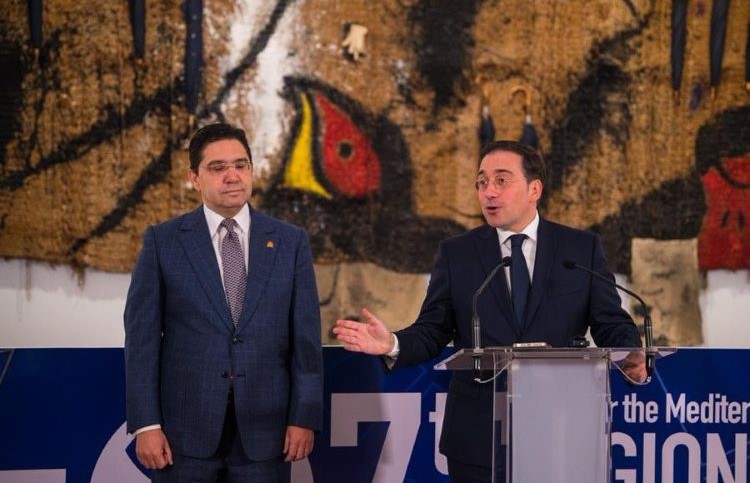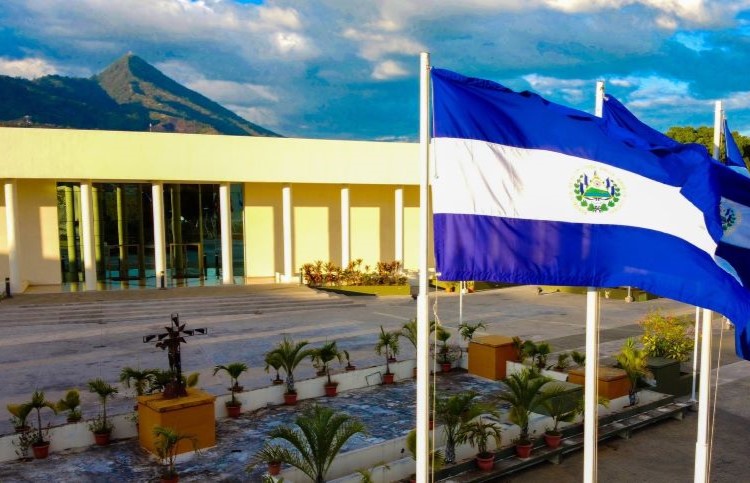The Diplomat
The Minister of Foreign Affairs, José Manuel Albares, held yesterday his seventh bilateral meeting with his Moroccan counterpart, Nasser Bourita (the third in less than a week), with whom he addressed the progress on the roadmap, commercial traffic through land borders and the holding of the High Level Meeting (RAN, by its Spanish acronym), which both dated for “late January or early February”.
“Today in Barcelona we continue to consolidate the progress of the roadmap with Morocco: increased trade exchanges, passage of goods, High Level Meeting,” Albares stated via the social network Twitter. “Morocco is a fundamental strategic partner in Euro-Mediterranean partnership,” he added. The meeting took place in the Catalan capital on the occasion of the double celebration of the VII Regional Forum of the Union for the Mediterranean (UfM) and the EU-Southern Neighborhood ministerial meeting at the Joan Miró Foundation of Barcelona.
At the joint press conference following the bilateral meeting, Albares assured that the roadmap designed last April 7 in Rabat by the President of the Government, Pedro Sánchez, and King Mohammed VI, “is being fulfilled point by point”. “All the working groups are meeting on a permanent basis and these meetings are bearing fruit,” continued the minister, who gave as examples of this collaboration the decrease “by 20 percent” of illegal immigration from Africa and the increase “by 30 percent” of bilateral trade.
In addition, Albares announced the forthcoming resumption “of the traffic of goods through the land borders of Ceuta and Melilla”. Last September, the two ministers pledged to work so that the beginning of the passage of goods “in an orderly and gradual manner through the land customs posts will take place throughout the month of January”. This measure will involve the reopening of the customs office in Melilla and the opening of the first customs office in Ceuta. In this regard, the Government of Pedro Sánchez is urgently processing the execution of works at the Tarajal border in Ceuta, in order to have the minimum infrastructure necessary for the entry into operation of a customs control point.
On the other hand, José Manuel Albares reiterated yesterday that the two governments are still trying to adapt their agendas so that the RAN can be held as soon as possible, if possible “at the end of January or early February”. In the same sense, Naser Bourita said that the intention of the two countries is for the meeting to take place in “the last week of January or the first week of February”. Last Tuesday, Albares declared in Fez (after holding an informal meeting with Bourita) that the date of the RAN depends on the “particularly full” agendas Pedro Sánchez and Mohammed VI.
The last RAN between Spain and Morocco was held in 2015 and the next one had been scheduled, in principle, in December 2020, but has suffered several postponements because of the COVID-19 pandemic and the deep bilateral crisis. Finally, the letter sent by Sanchez to Mohamed VI in which he affirmed that the autonomy plan for Western Sahara constitutes “the most serious and realistic basis” laid the groundwork for the recovery of diplomatic relations and paved the way for the holding of the High Level Meeting, mentioned in the Joint Declaration of April 7. The HLM was initially scheduled for November, but was postponed until early 2023.
Nasser Bourita
“Today we discussed the implementation of the bilateral roadmap and expressed our full satisfaction with the implementation of all the requirements of this roadmap and the full commitments,” said, for his part, Nasser Bourita at the press conference. “We are in a new phase of our relationship and we are pleased to continue working in all sectors: economic cooperation, political dialogue, the fight against illegal migration and terrorism, regional security, the development of the cultural dimension and cooperation in security,” the Moroccan minister continued.
“Our cooperation is the only success story of cooperation in the fight against illegal migration in the Mediterranean region and has done a lot not only for the security of Morocco and Spain, but for the whole region,” Bourita added.
Absence of Algeria
Not present in Barcelona yesterday was the Algerian Foreign Minister Ramtan Lamamra, who is in Niamey, capital of Niger, to participate in a meeting of the Executive Council of the African Union. Algeria has particularly tense diplomatic relations with two of the major protagonists of both the UfM Regional Forum and the EU-Southern Neighborhood meeting: the host Spain and Morocco.
In 2021, neither Bourita nor Lamamra, whose diplomatic relations remain broken at present, attended Barcelona. Last year, Spain’s main problem was the serious deterioration of its relations with Morocco because of their differences over the Saharawi dispute, but the new stage of friendship initiated by both countries because of the new position of Pedro Sanchez’s government regarding Western Sahara has resulted in a very serious diplomatic crisis between Spain and Algeria, a great ally of the Polisario Front and the main supplier of gas to Spain, in the midst of international energy uncertainty due to Russia’s war in Ukraine.







